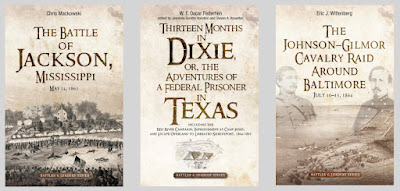Usually, I do not
lack for project ideas. As I drudge through the minutiae of history, I see
plenty of holes in the historiography that need to be filled or expanded upon.
It is, however, always nice when a publisher contacts me with an idea. Ted
Savas, of Savas Beatie Publishing, recently did that, asking me to tackle a new
project on the April 1864 battle of Plymouth, North Carolina. This project fits
well into my interests of North Carolina history and the history of the 1860s.
 |
| Replica of the CSS Albemarle |
The battle of Plymouth was a somewhat successful attempt to wrest control of eastern North Carolina away from the Federals. Ever since the loss of camp Hatteras, Roanoke Island, and New Bern, the Confederates had been worried the Federals’ forays could wreck the precious railroad that ran between Wilmington and Virginia. One such earlier expedition at New Bern was unsuccessful. This new attack, led by Maj. Gen. Robert F. Hoke, proved successful. Part of that success was due to the use of the incomplete CSS Albemarle. The success at Plymouth led the Federals to abandon Washington (North Carolina) as well, although a second attack at New Bern on May 5 was unsuccessful. Plymouth remained under Confederate control until the end of October 1864.
This new project
will be a part of Savas Beatie’s new Battles and Leaders Series, one that
focuses on small battles and events that took place during the war. There are
three titles so far in this series, and I encourage you to check them out here.
 |
| Battles and Leaders Series from Savas Beatie |
What am I bringing to this project? Years of writing about the war, and years of writing about North Carolina to start with. I’ve already uncovered some little-used sources, and I am sure there are many more out there waiting to be found. Another aspect are some well-crafted maps that explore the battlefield. As far as the battlefield goes, there is really not much left today of the entrenchments that the Federals constructed during the war. There is a really good museum in town, the Port o’ Plymouth Museum, that I encourage you to check out. (We were there this past July.) This will be my 2022-2023 winter project, and it will allow me to explore some topics I’ve only written about briefly, like the CS and US Navies.
I’m really looking
forward to diving into a new project!
My husband's 3rd cousin was Colonel John Thomas Mercer of the 21st Georgia. He was the highest ranking officer killed in the battle of Plymouth on April 18, 1864.
ReplyDeleteMercer's picture was posted inside the museum. He was shot in the head while leading an attack on Union forces.
He is buried in Tarboro,NC at Calvary Episcopal Church Cemetery. He was a distant cousin of General William Dorsey Pender, and is buried in front of General Pender's grave. Pender and Mercer attended West Point together.
We attended the reenactment there every year, and always visited Mercer and Pender's graves and placed the First National flag at their graves.
Colonel Mercer and my husband, Don Watson, are related to the Mercers that formed a lot of Southern Baptist Churces in Georgia, and the Mercers formed Mercer University in Georgia.
It was my favorite reenavtment.
Congratulations
ReplyDelete